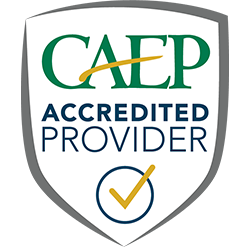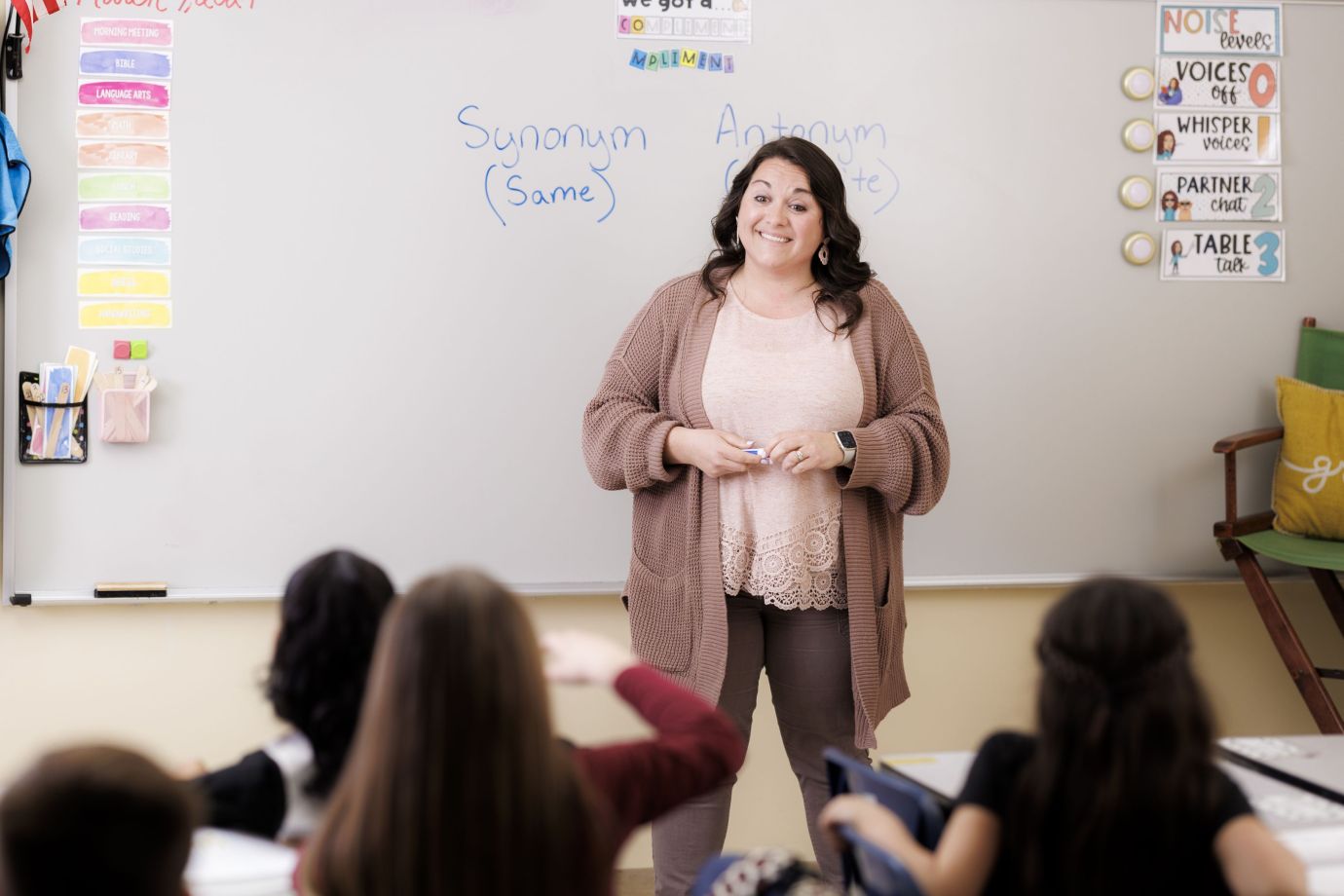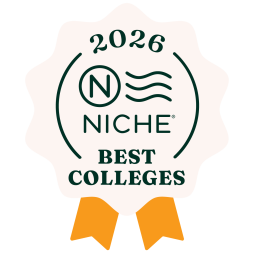
Bachelor of Education (B.Ed.) in Special Education
Overview
Effectively Teach Your Future Students with Liberty’s B.Ed. in Special Education
Do you have a heart for children with special needs? Maybe someone close to you has a disability, or you even feel called to help people who are struggling academically or socially. Whatever has led you to consider a career in this specialized field, our Bachelor of Education (B.Ed.) in Special Education will allow you to work with young students with disabilities to improve their quality of life in academic settings.
Our B.Ed. in Special Education is a teacher licensure degree that can help equip you for licensure in special education and help prepare you for the general curriculum needs of your students. Our program is designed to meet Virginia state licensure requirements, allowing you to teach special needs students.
Let us come alongside you as you pursue a teaching career that truly makes a difference. We can help you develop skills to work with parents and students, so you can be better prepared to set your students up for success. If you feel like your calling is to teach special education, we have the degree for you.
Upon successful completion of Liberty University’s Virginia state-approved Bachelor of Education program, you may apply for your teaching license in another state through reciprocity, which may or may not result in additional requirements based on your state’s Department of Education regulations.
Credit Hours
View CoursesNext start date: Aug 24, 2026

CAEP Accredited
Highlights of Our B.Ed. in Special Education Degree
National Recognition and Financial Aid Opportunities
Liberty University’s School of Education meets rigorous national standards for educator preparation – standards set by the Council for the Accreditation of Educator Preparation (CAEP). Additionally, by pursuing one of our B.Ed. licensure-tracks, you may be eligible for the Federal TEACH Grant – a financial aid opportunity for aspiring educators.
Extensive Hands-On Experience
Before you graduate, you’ll complete 90 practicum hours and at least 1 full semester of student teaching – giving you real classroom experience to build your confidence and skills. You’ll have the opportunity to complete your student teaching in a variety of school settings across Virginia.
Experienced Faculty
All licensure-track courses are taught by faculty who have real-world K–12 classroom experience and hold current teaching licenses. Their active engagement in the field helps bridge the gap between theory and practice, preparing you for the realities of today’s classrooms.
Opportunities for Professional Growth
At Liberty, you can get involved with professional and student organizations that align with your goals – allowing you to build connections, expand your network, and prepare for a future in education.
Career Potential
What Can You Do with a Bachelor of Education in Special Education Degree?
Liberty University’s Bachelor of Education in Special Education can help prepare you to pursue the following occupations:
- Early childhood special education teacher
- Early intervention specialist
- Special education advocate
- Special education specialist
- Special education teacher

Courses
What Will You Study in Our Bachelor’s Degree in Special Education?
Our B.Ed. in Special Education is designed to grant you teacher licensure. Because of the requirements involved in teacher licensure, your coursework will focus on a variety of different subjects, from general studies to education.
You will complete foundational courses in math, history, English, and science to fulfill content competencies. These include the major subjects that most elementary and middle school students will be learning. For instance, you will dive into principles of biology, composition and literature, geometry, and physics.
Once you start your special education courses, you will hear about the diversity of those with disabilities. By understanding how to manage the varying severity seen in a class of children with disabilities, you can create better behavior management and group inclusion for your students. Additionally, you will study how to work with families to help students have a smooth educational experience, like the transition from middle school to high school.
Featured B.Ed. in Special Education Courses
EDSP 363 – Behavior Management
EDSP 413 – Inclusion and Diversity: Effective Practices and Strategies
EDSP 473 – Assessment and Transition Planning for Diverse Learners
EDUC 225 – Instructional Design for Elementary & Middle School Classrooms
Degree Information
- Explore further with the Degree Completion Plan
- Check out our course catalog
- This program falls under our School of Education
- Transfer in up to 75% of the degree total
Additional Degree Information
BENEFITS
Why Choose Liberty’s Bachelor of Education in Special Education Degree?
Unlock New Opportunities
Choosing to pursue teaching licensure through Liberty University’s Special Education program opens the door to a wide array of exciting career paths. Whether you dream of making a difference in traditional classroom settings or want to explore specialized environments, our program is designed to prepare you for your next steps. You can gain tools and confidence to support diverse learners and become a compassionate, knowledgeable educator who can make a lasting impact.
Trusted and Accredited Educator Preparation
Liberty University’s School of Education is proud to meet the high standards established by the Council for the Accreditation of Educator Preparation (CAEP). This accreditation affirms the quality and rigor of our educator preparation programs, offering both students and future employers confidence in the strength of our curriculum and training. You can graduate knowing that your education meets national benchmarks for excellence in teaching.
Enjoy Opportunities for Unique Academic Experiences
Liberty offers a range of student teaching locations across Virginia, with the added option of studying in the nation’s capital through our Washington Fellowship program. Spend a semester in Washington, D.C., and put your knowledge into action while gaining valuable experience. This immersive opportunity can help you build connections in a dynamic environment.
Connect with Like-Minded Educators
As a student in our program, you’ll have opportunities to engage with professional and student organizations that align with your interests and career goals. For example, if you’re passionate about special education in urban environments, you can join our Urban Education Club. This residential organization allows you to collaborate with peers and faculty who share your dedication – offering both inspiration and practical preparation for working in urban school districts.
Tuition & Aid
How Much Does it Cost to Attend Liberty On Campus?
Knowing up-front what you’re paying for and why can go a long way toward making you feel comfortable about your investment. This overview of major college costs can give you an idea of what’s coming so you can create an accurate budget from the start.
All Tuition & Aid
| Part-time (<12 Credits) | $845 |
These rates are reflective of academic year 2025-2026. Tuition rates may change annually. For the most current information, please visit our Tuition and Aid page.

#2 Best College Campus in America
At Liberty, you’ll find an affordable, high-quality education designed to help equip students like you for the real world. Our commitment to excellence has earned us recognition as the #2 Best College Campus in America by Niche.com for 2026.
Earning your degree from a nonprofit university with state-of-the-art resources like ours can help set you apart from your peers.
Specializations
B.Ed. in Special Education Specializations
Get ready to personalize your path! This degree isn’t one-size-fits-all – you have the chance to explore specializations that align with your interests, strengths, and the students you feel called to serve. Each specialization lets you dive deeper into targeted areas of special education, helping you build practical skills, sharpen your expertise, and stand out as a future educator who’s ready to make a real impact. Explore your options below and discover where your passion can take you in the world of special education.
Special Education Specializations
Adapted and General Curriculum K-12
Adapted Curriculum K-12
General Curriculum K-12
Admissions
How Do You Become a B.Ed. in Special Education Student?
Every application is reviewed by the admission committee on a case-by-case basis, meaning there are no set minimums for acceptance. However, all applicants must submit the following documents* for admission:
- Admission application
- Official high school transcripts
- Official college transcripts (if applicable)
- Admission essay
Results from the CLT, SAT, or ACT are not required for admission, but may be used in consideration for merit-based aid.
*Note that additional documentation may be requested by the admission committee after your application has been received.

Have Questions?
We’ll make sure you have the information you need to take your next step.